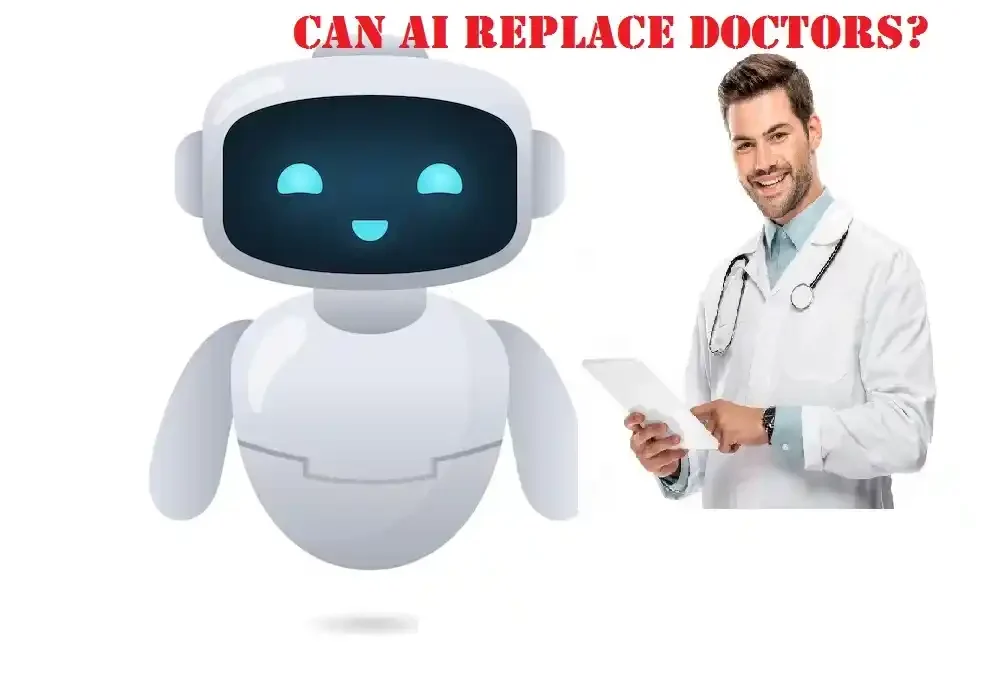A mother is sitting anxiously in a pediatrician’s clinic….She has been cradling her feverish kid. However, instead of a physician approaching with a stethoscope, a screen lit up on the wall. Then, a calm voice asked- ‘’Please describe your symptoms”. The AI system then starts processing her answers to check the child’s health status. It then recommends a diagnosis even before a human doctor enters the room. ……You might have already imagined such scenes. Right? You have started wondering about the possibility of AI replacing doctors.
So, the question is- Would a human doctor be replaced with an AI doctor? This blog analyzes experts’ views and provides useful information.
What Do Experts Say About AI Replacing Doctors?
The fear that AI technology could replace human jobs is nothing new. As per Vinod Khosla (the co-founder of Sun Microsystems), machines or robots will be the substitute for 80% of physicians in the future healthcare sector, driven by entrepreneurs (and not medical experts). Some experts claim that there is no need to train radiologists. Image perception algorithms would work better than humans.
However, medical education and technologies need significant transformation to adapt to the AI-driven future. The FDA has already approved several AI-assistant medical devices. The first one authorized by the FDA is an autonomous diagnostic system (developed by Dr. Abramoff). The device was designed to diagnose diabetic retinopathy.
How AI Can Help Doctors
AI in most industries helps workers reduce their workload. This technology has a significant effect on the healthcare industry. So, let us discuss how AI is helping doctors.
Better Diagnostic Accuracy
Machine Learning algorithms have the potential to sift through a vast dataset to detect patterns often overlooked by humans. For example, radiologists interpret several medical images every year. However, deep learning, an ML technology, can analyze those medical images accurately. It helps physicians detect diseases earlier and choose preventive strategies.
Automate Daily Workflow
AI in healthcare is best for routine administrative tasks. The technology automates and optimizes several regular tasks performed by doctors. For instance, it can automatically-
- Identify the billing code depending on the doctor’s note
- Translate medical documents into multiple languages
- Manage database work
Thus, by removing these burdens from a doctor’s shoulders, AI provides several benefits.
Improve Drug Discovery
In the pharmaceutical sector and medical sciences, advanced algorithms streamline different things, from order fulfillment to supply chain management. AI is also helpful in generating regulatory documents.
Allow Doctors to Focus on the Past Experiences
AI enables physicians to check their own medical performance. The technology scans video footage and tracks actions performed by surgeons. So, if you have not remembered a surgery-related note, AI detects the details in the surgical video footage.
AI also identifies if the surgeon has performed differently, which may affect the outcome.
Provide Personalized Experience to Patients
Patient care is easy to personalize with AI in medicine. For example, in the oncology department, AI systems can indicate the exact position of a tumor. By combining patient data and image analysis, oncologists can personalize the patient’s treatment plans.
AI Can Never Replace Doctors- Why?
AI will transform the way doctors work, but it can never replace doctors. Why? Check the reasons-
AI cannot Show Empathy
An AI-driven system or robot can never mimic empathy. Unlike AI doctors, human doctors can build trust and listen to a patient’s unique needs. They can express their feeling of understanding. (You can check my blog about AI and emotional intelligence)
Right now, no one can trust a robot for a life-altering decision. We cannot trust machines for taking blood samples or for life-changing diagnoses.
Doctors Rely On Non-Linear Working Process
Suppose you have approached a doctor after getting poisoned for some reason, such as food poisoning or drugs. To determine the cause of poisoning, doctors would recommend various diagnostic methods and treatment options. They would continue it until they detect the root cause.
But, no algorithm can make this type of diagnosis. Data and quantitative analytics are important for every doctor’s diagnosis. The experts do not rely on a linear process but use their problem-solving skills that robots don’t have.
Complex Technologies Need Competent Experts
Digital health solutions are getting more complex and need a medical expert’s competence to use them. Even though AI is advanced, only human brains can deal with complex analysis.
Common Problems Faced By Doctors with AI Tools
AI in healthcare can cause a few issues-
- Without proper security, sensitive patient data can lead to risks, such as insurance fraud and identity theft. Doctors must not use publicly available chatbots and unsecured AI tools while dealing with patient data.
- AI systems often generate misleading details and incorrect data. Inaccuracies in medical data can cause life-threatening conditions.
- Some AI systems work like a black box and do not explain how they have derived data. Healthcare service providers should choose tools that provide correct citations for AI-generated content.
Physicians and AI- Partners for Each Other
The future healthcare industry will see a collaboration between physicians and AI for comprehensive and improved patient care. AI generates data sets to assist doctors in making informed decisions. However, the reliability of AI for medical solutions depends on the data that has been fed. The technology is yet to reach the level where it can identify subtle differences in the anatomical structures of every individual. So, whether AI replacing doctors will become a reality in the near future is uncertain.

